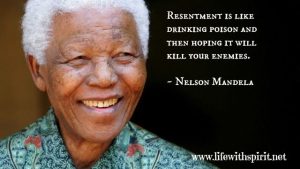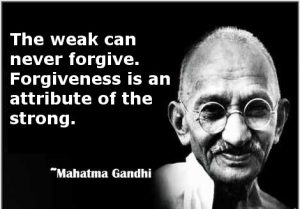 Nelson Mandela – An anti-Apartheid activist who paid for it with decades of imprisonment. He led an austere life where he never drank or smoked, and was gracious to people in all walks of life. He became recognized as the father of South African democracy, and has received many awards, among them the Nobel Peace Prize in 1993.
Nelson Mandela – An anti-Apartheid activist who paid for it with decades of imprisonment. He led an austere life where he never drank or smoked, and was gracious to people in all walks of life. He became recognized as the father of South African democracy, and has received many awards, among them the Nobel Peace Prize in 1993.
 Mohandas K. Ghandi – The person who taught us passive resistance, overthrew British rule of India without a shot being fired, and was the inspiration for human rights groups around the world. In India, his birthday on October 2 has been declared a national holiday. He saw India gain its independence in 1947, but died in New Delhi a year later at the hands of an assassin named Nathuran Godse. He and co-conspirator Narayan Apte were sentenced to death by execution in 1949. It is ironic that the manner of justice brought before Ghandi’s assassins would have been something Ghandi himself would have strongly opposed. Back to the topic, Ghandi was definitely a teetotaler, and his reasons appeared to have been moral reasons. He was a supporter of prohibition, and in Ghandi’s memory, many Indian states have passed prohibition laws. But after our bout with prohibition in North America, we know you can’t legislate morality, since organized crime would push back even more, and deaths linked to distilling one’s own “home brew” will be on the rise, as is still being felt in many Indian states where the law is still in effect. The moral of this tale is that teetotaling, like morality, is as much of a personal choice as it ever was, rather than being something that needs to be imposed on people. I would rather say that “I can have all the booze I like: I just choose not to drink any”, and would feel better that teetotaling is an act of will. Passing laws takes away from the dignity of what ought to be a free choice.
Mohandas K. Ghandi – The person who taught us passive resistance, overthrew British rule of India without a shot being fired, and was the inspiration for human rights groups around the world. In India, his birthday on October 2 has been declared a national holiday. He saw India gain its independence in 1947, but died in New Delhi a year later at the hands of an assassin named Nathuran Godse. He and co-conspirator Narayan Apte were sentenced to death by execution in 1949. It is ironic that the manner of justice brought before Ghandi’s assassins would have been something Ghandi himself would have strongly opposed. Back to the topic, Ghandi was definitely a teetotaler, and his reasons appeared to have been moral reasons. He was a supporter of prohibition, and in Ghandi’s memory, many Indian states have passed prohibition laws. But after our bout with prohibition in North America, we know you can’t legislate morality, since organized crime would push back even more, and deaths linked to distilling one’s own “home brew” will be on the rise, as is still being felt in many Indian states where the law is still in effect. The moral of this tale is that teetotaling, like morality, is as much of a personal choice as it ever was, rather than being something that needs to be imposed on people. I would rather say that “I can have all the booze I like: I just choose not to drink any”, and would feel better that teetotaling is an act of will. Passing laws takes away from the dignity of what ought to be a free choice.
Views: 109
